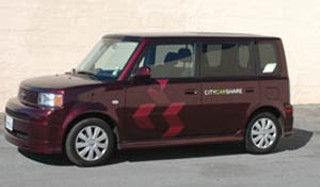Can Austin Carshare?
Several car-sharing proposals hope to reduce auto spending, traffic, and pollution
By Daniel Mottola, Fri., Nov. 11, 2005

In densely populated cities such as Seattle; Washington, D.C.; and Chicago, car-sharing organizations have flourished as an attractive alternative to the burdens of car payments, maintenance, insurance, and parking. Members are offered a variety of vehicles, parked in reserved spaces near mass transit stations and throughout popular neighborhoods. The vehicles are available 24 hours a day in most cases through an automated reservations system, for a mileage and hourly rate that includes insurance and gas. Aside from saving money (some customers claim up to 94% savings over car ownership), the various car-sharing outfits boast that each of their vehicles replaces as many as 23 cars and reduces individual car usage by up to 50%, drastically improving air quality and traffic.
Two national corporations and two local startups have expressed interest in bringing car sharing to Austin – an untried experiment in Texas, where people like their space and love their vehicles. One of those corporations, Seattle-based Flexcar, just received the hefty financial backing of AOL founder Steve Case's venture capital firm Revolution, and the guidance of auto industry stalwart and former Chrysler president Lee Iacocca, as a senior advisor and investor.
Meanwhile, Elliott McFadden, the new director of local renewable energy advocacy group Solar Austin, is working to launch a nonprofit known as Austin CarShare. He explained that with car-sharing, people are "making a choice on what the best mode of transportation is," and since they don't have anything invested in a car, they're less likely to pay for one when walking, biking, or taking the bus is a more viable option. McFadden said Austin CarShare would be a natural fit with light rail, while keeping more transportation dollars in town. Being a nonprofit, he said, would focus operations on better, ever-expanding service, rather than on paying off investors. He said the Austin CarShare model is based on nonprofits like PhillyCarShare in Philadelphia, which has more than 2,000 members, and City CarShare in San Francisco, with 4,000. PhillyCarShare partnered with the city to replace 330 sedans in its fleet, which are now shared with residents, a move said to save taxpayers $2 million a year – which McFadden believes is very possible in Austin.
Senior city planner Katie Larsen said Austin is working with Capital Metro, UT, and the state through the Legislature-created State Council on Competitive Government to explore local car-sharing and fleet replacement options. The CCG will pool the resources of the participating entities to encourage and promote car sharing, and reserve on-street parking for car share vehicles, Larsen said, adding that the city of Austin has 169 cars driven less than 2,500 miles per year that it would like to replace with car-share vehicles. "Knowing that we live in a city not designed for getting around without a car, car-sharing could be used as a backup to available mass transit and bicycling," she said, adding that car share vehicles, placed at major transit stations and stops, would help complete people's connections. Larsen said the CCG plans seek proposals for car-sharing contracts some time next year.
Boston-based car share company Zipcar also intends to expand operations to Austin. And a representative of a for-profit Austin car-sharing startup said business feasibility studies are ongoing and that they would announce their intentions soon. For more info, see www.carshareaustin.org.
Got something to say on the subject? Send a letter to the editor.








